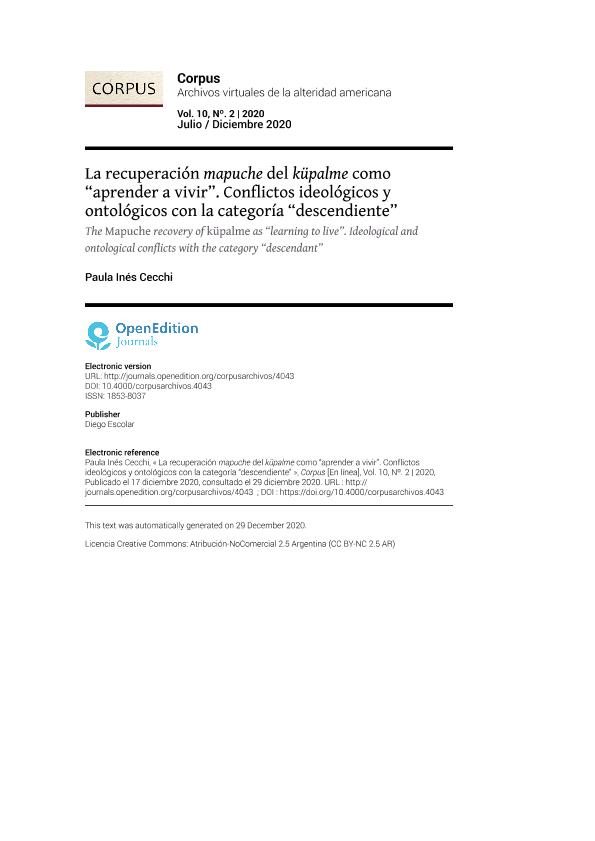Artículo
En este artículo analizo los sentidos hegemónicos de la categoría “descendiente” (de mapuche), sus usos autoadscriptivos y el concepto mapuche küpalme, referido a la procedencia. Argumento que las reflexiones entre integrantes del pueblo mapuche sobre el término “descendiente” involucran dos planos: uno ideológico y otro ontológico. En el plano ideológico, discuten con el discurso hegemónico ―que en el marco de la ideología del mestizaje anuncia la pérdida de identidad mapuche― al que caracterizan como racista y definen “descendiente” como una categoría colonial mediante la que se ejerce violencia epistémica. En el plano ontológico discuten con la ontología moderna que solo asume la agencia humana y considera la herencia como un fenómeno biológico, dado y relativo al pasado. En el concepto de küpalme reconocen la agencia de otras fuerzas y entidades además de las humanas, no solo en el pasado sino como guía para la toma de decisiones en el presente. En los usos autoadscriptivos del término “descendiente” se expresan sentidos contrapuestos que remiten a esas disputas. Aun afectadas por los criterios de las definiciones hegemónicas sobre quién puede ser mapuche, las personas que se autoidentifican como descendientes y buscan reencontrarse con la historia de su pueblo se distancian del postulado que define la pérdida inexorable de la identidad, en un proceso de des-sujeción respecto al discurso hegemónico. In this paper I analyze the hegemonic meanings of the term (Mapuche) “descendant”, its self-ascribed uses, and the Mapuche concept of küpalme, which refers to their origin. My argument is that the discussion among the Mapuche people over the category “descendant” involves two different levels: an ideological level and an ontological one. On the ideological level they discuss with the hegemonic discourse―which, in line with the ideology of mestizaje, announces the loss of Mapuche identity― by characterizing it as racist and by defining “descendant” as a colonial category through which epistemic violence is exerted. On the ontological level they discuss with the modern ontology, which assumes the agency only of humans and which considers heritage as a biological and given phenomena that refers to the past. In the concept of küpalme they recognize the agency of other forces and entities besides humans, and not just in the past but also guiding the making of decisions in the present. The self-ascribed uses of the term “descendant” express opposed meanings referring to these disputes. Even when affected by the hegemonic criteria about who can be Mapuche, the persons who recognize themselves as descendants and who seek to rediscover the Mapuche people’s history and be part of it grow apart from the statement that sustains the inexorable loss of identity, in a process of desubjection from the hegemonic discourse.
La recuperación mapuche del küpalme como ''aprender a vivir'': Conflictos ideológicos y ontológicos con la categoría ''descendiente''
Título:
The Mapuche recovery of küpalme as ''learning to live'': Ideological and ontological conflicts with the category ''descendant''
Fecha de publicación:
12/2020
Editorial:
Diego Escolar
Revista:
Corpus
e-ISSN:
1853-8037
Idioma:
Español
Tipo de recurso:
Artículo publicado
Clasificación temática:
Resumen
Palabras clave:
MAPUCHE
,
DESCENDIENTE
,
IDEOLOGÍA DEL MESTIZAJE
,
CONFLICTOS ONTOLÓGICOS
Archivos asociados
Licencia
Identificadores
Colecciones
Articulos(CCT - PATAGONIA CONFLUENCIA)
Articulos de CTRO.CIENTIFICO TECNOL.CONICET - PATAGONIA CONFLUENCIA
Articulos de CTRO.CIENTIFICO TECNOL.CONICET - PATAGONIA CONFLUENCIA
Citación
Cecchi, Paula Inés; La recuperación mapuche del küpalme como ''aprender a vivir'': Conflictos ideológicos y ontológicos con la categoría ''descendiente''; Diego Escolar; Corpus; 10; 2; 12-2020; 1-25
Compartir
Altmétricas




